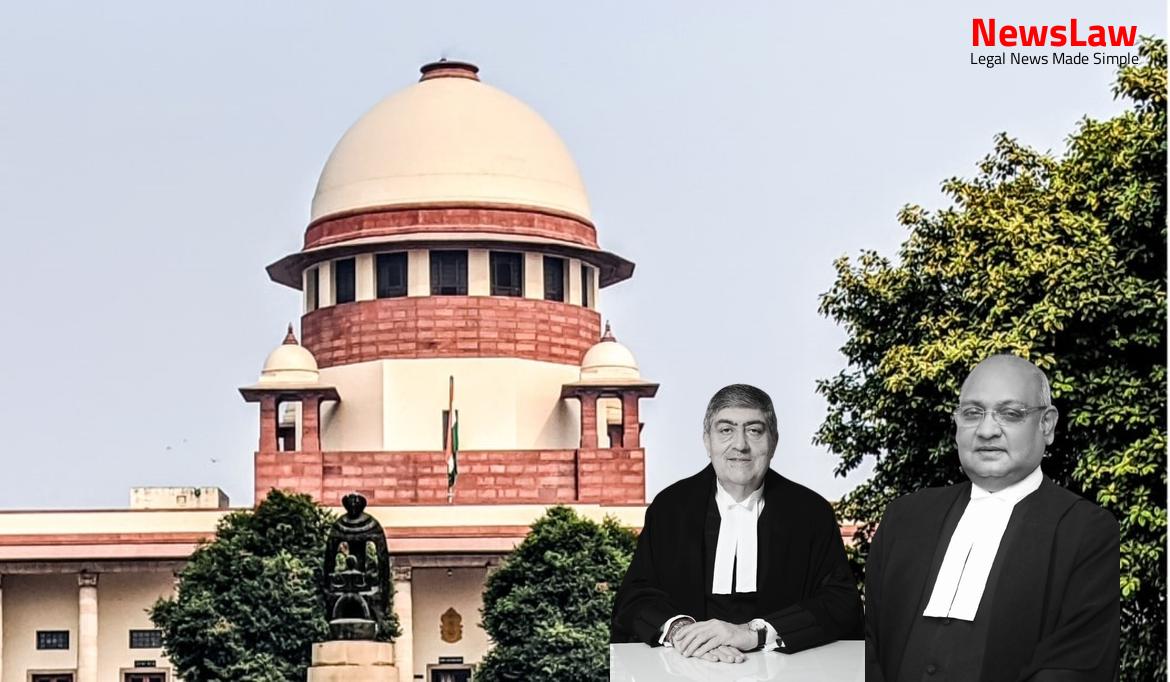In a recent landmark decision by the Supreme Court of India, concerning the violation of the Seeds Act, the desealing of the Dhanora unit was ordered. The case highlighted the importance of adhering to licensing regulations for the storage and sale of seeds. The Court’s judgment sheds light on the legal complexities surrounding seed storage and transportation practices.
Facts
- The Seed Inspector issued a notice to the respondent-Company on 15.12.2017 regarding the lack of a license for storage or sale of seeds in Dhanora unit.
- The Plant Manager was informed that the appellant Company does not have the necessary license and that the activity of seed sale was being carried out by the respondent in their godown at Dhanora.
- The Plant In-Charge submitted details of crop wise, variety wise, and lot wise quantity of seeds in the godown on 10.12.2017.
- The godown at Dhanora was sealed to prevent further violations after the respondent failed to produce required documents.
- The High Court directed the authorities to open the sealed godown after taking a prima facie view, stating that no separate license was required for storage in the godown attached to the processing unit for transportation purposes.
- The appellant-authorities do not have the power of sealing to keep storage sealed indefinitely.
- Sealing power cannot be used until the laboratory report is received.
- The High Court clarified that the sealing power was not available to the appellant-authorities for this purpose.
Also Read: High Court Acquittal Case of State of Uttar Pradesh v. Jai Prakash
Issue
- The High Court concluded that the power of seizure and sealing the godown is not available to the Seed Inspector.
- Seed is essential for successful agricultural production and the case revolves around the storage and transportation of seeds.
- The High Court held that separate licenses were not required for storage meant for transportation in the Dhanora unit.
Also Read: Judgment Review: Supreme Court’s Ruling on the Capital Punishment Appeal
Arguments
- Respondent Company did not obtain a license for storage of seeds in the godown attached to the processing unit
- Alleged violation of Seeds Act, 1966 and Seeds (Control) Order, 1983 by storing seeds without a valid license for sale
- Packaging and labeling of seeds indicate they were packed for sale, not just transportation as claimed by the Company
- High Court’s distinction between ‘storage for sale’ and ‘storage for transportation’ was criticized by the Petitioner’s counsel
- Illegal storage of prohibited seeds ‘Ballgard II x RRF Cotton Hybrid’ without extension of field trial permission
- Competent authority has the power to seal the godown for violation of Seeds Act, 1966 and keep it sealed for testing purposes
- The respondent-Company has obtained seed licenses under relevant provisions
- No separate license is required for processing cotton and non-cotton seeds at Dhanora unit
- Processed seeds are stored in the godown for transportation to different sale points
- Seizure and sealing power not available to Seed Inspector as claimed by appellant authorities
- High Court rightly directed the desealing of the godown attached to the processing unit
- Impugned order does not warrant any interference
Also Read: Compromise Reached: Reddy Satyanarayana vs Narapureddy Sanyasi Rao
Analysis
- The Seed Inspector has the power to enter and search any premises where an offence under the Seeds Act is believed to have been or is being committed, as per Section 14(1)(c) of the Seeds Act, 1966.
- The Seed Inspector is empowered to exercise necessary powers for carrying out the Act or any rules made thereunder, as per Section 14(1)(e) of the Seeds Act.
- The Seed Inspector must have sufficient cause to believe that an offence under the Act has been or is being committed before exercising the power to seal premises, as per Section 26 of the Penal Code.
- Sealing of premises should be done only in exceptional circumstances and for the purpose of carrying out the Act or rules made thereunder.
- Before sealing premises, the Seed Inspector must record grounds for their belief and communicate these grounds to the Magistrate and their superior.
- The respondent was found to have stocked genetically modified seed of RRF Hybrid Cotton without providing valid permission from GEAC beyond 2013.
- The High Court’s finding that the Seed Inspector did not have the power to seal the storage of seeds at Dhanora was in breach of the provisions prescribed under the Seeds Act.
- The activities of labeling and packaging of seeds at the Dhanora godown by the respondent were illegal without obtaining the necessary licenses.
- The respondent’s claim that Dhanora plant is a processing unit does not justify the packaging, pricing, and labeling of seeds without the required licenses.
- The High Court erred in disregarding the material presented regarding the stocking of ‘Roundup Ready Flex (BGII RR Flex) Cotton Hybrid’ at the Dhanora godown.
- Licence to carry on the business of a dealer in seeds is granted as per Form ‘B’ of the Seeds (Control) Order, 1983.
- Seed Inspectors perform quality control inspections and regulate the sale, export, import, and storage of seeds.
- Seed Inspectors are empowered to search or inspect premises where they suspect an offence has been committed.
- Seed Inspectors can examine records, registers, documents, and seize them if they believe they provide evidence of an offence.
- The business of selling seeds is regulated by the Seeds Act, 1966 and Seeds (Control) Order, 1983.
- No person can sell, export, or import seeds without a license as per the terms and conditions of Form ‘B’ under the Seeds (Control) Order, 1983.
- Seed Inspectors have the power to inspect places used for growing, storing, or selling seeds and can seal premises in exceptional cases of non-compliance.
- Seed Inspectors are empowered to exercise other necessary powers for carrying out the purposes of the Seeds Act or any rule made thereunder.
- The Seed Inspector’s duties include taking samples, dividing them, and following specified procedures as per the Seeds Act and Seeds Rules.
- Provisions of the Seeds Act, Rules, and Code of Criminal Procedure apply to searches, seizures, and inspections conducted by Seed Inspectors.
Decision
- The impugned judgment of the High Court has been set aside.
- The appeal has been allowed.
- The Dhanora unit of the first respondent has been desealed in compliance with the High Court’s order dated 22.12.2017.
- No further direction is needed regarding the desealing of the Dhanora unit.
Case Title: THE STATE OF MAHARASHTRA Vs. MAHARASHTRA HYBRID SEEDS CO. PVT. LTD.
Case Number: C.A. No.-006564-006564 / 2019



